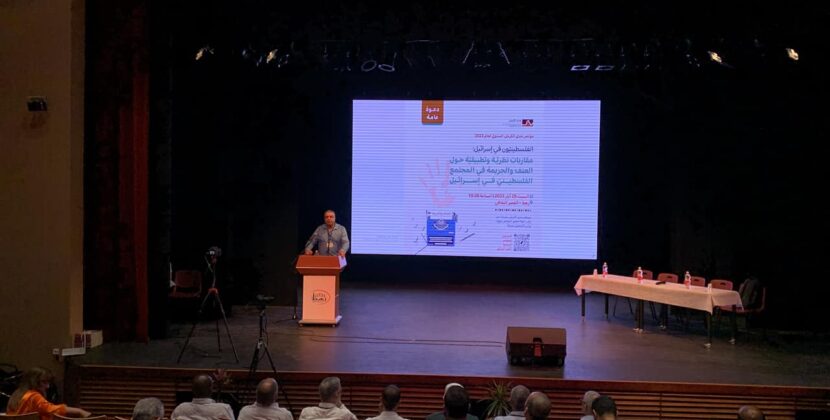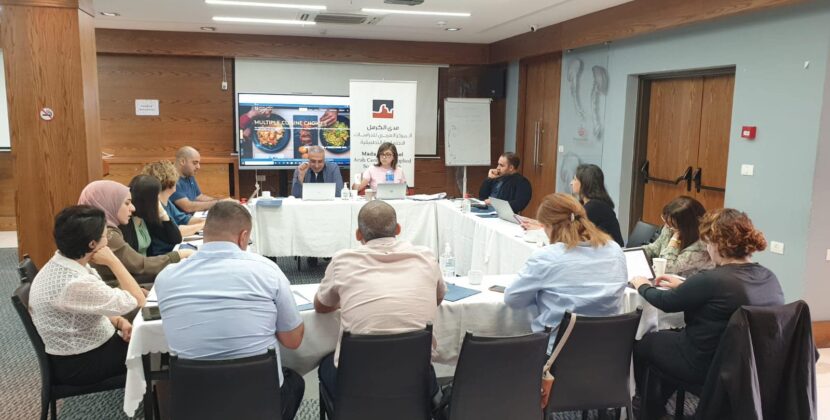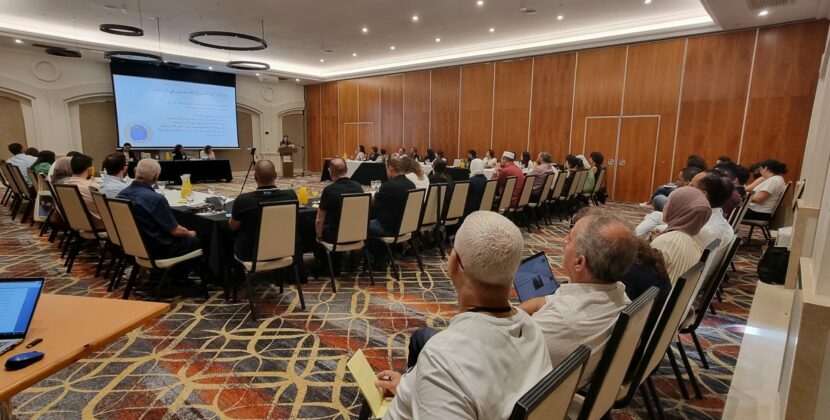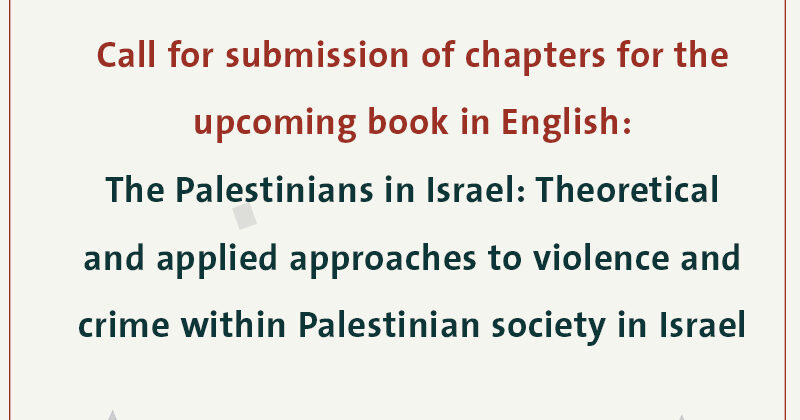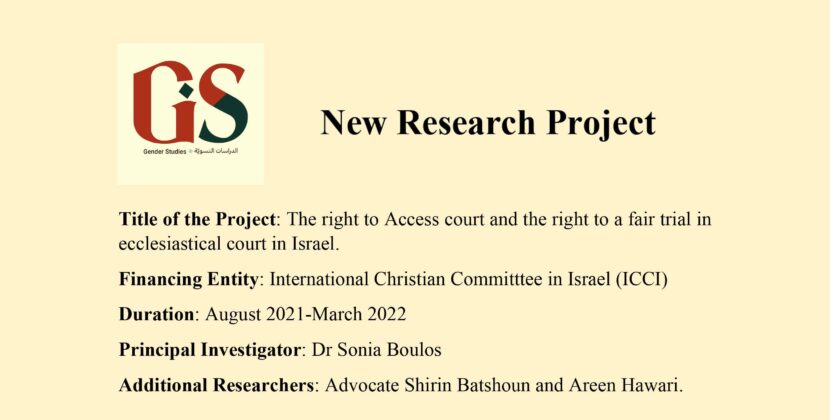Phd Student Support Program
Mada’s work can only be carried out with the participation of thoughtful, well-trained, effective Palestinian scholars in the social sciences and humanities. Mada provides a supportive home for young Palestinian academics and senior scholars who face alienation at Israeli universities and colleges. They meet at academic forums, seminars, and workshops, exchange ideas in their native language, learn new theoretical approaches, and benefit from support for their individual work and overall development as scholars.
PhD Program
Palestinian students in Israeli universities face discrimination and barriers to their education on myriad levels. The climate of the Israeli university—through its architecture, language, staff, professors, and curricula—promotes Israeli-Jewish hegemony and exclusivity at the expense of Palestinian students and their educational experience. Arabs are typically a minority in the classroom, and the classes are taught in a language that is not their mother tongue, with few opportunities available for students to express themselves or explore academic literature in Arabic. At the same time, many among the Jewish majority, who typically serve in the army before attending university, regard Palestinian students as a ‘security threat’ to be feared and mistrusted. Meanwhile, fields of study that could potentially legitimize a Palestinian claim to the country are often omitted from the curriculum of many relevant courses.
As a result of systemic discrimination throughout the entire trajectory of Palestinian students’ educational experience, and even more as a result of the hegemony exercised by the state over all Israeli education, the Palestinian community in Israel lacks the infrastructure for nurturing independent, bold, authentic intellectual leaders and scholars. For the year 2011-2012, only about 4.4% of PhD students in Israeli universities were Arab. Furthermore, there are few spaces available for this small number of Palestinian PhD students to congregate together as an academic community, leaving them vulnerable and subject to marginalization.
In January 2015, attempting to address the unmet needs of Palestinian PhD students, Mada launched its PhD Program. The program aims to provide an alternative and compensatory intellectual space for Palestinian PhD students – a space where their research can grow and where they can contribute to developing an intellectual agenda for a new generation of scholars. In this space, Mada will provide Palestinian PhD students with an intellectual climate that is not generally available for Arab students within Israeli academia, as well as the opportunity to be trained in critical thinking, to receive exposure to alternative literature and ideas, and to share their research and ideas in a dynamic academic discussion with other top-tier students and established scholars.
Mada’s PhD program consists of four components:
1. PhD Grants Program
State grants and scholarships for post-graduate degrees at Israeli institutions are often unfavorable to Palestinian students. In many cases, completion of army service is taken into consideration along with the student’s financial situation and academic performance. Palestinian citizens do not enlist in the army and are therefore excluded from some forms of financial support that are available for Israeli Jewish students. Many other scholarships available in Israel are from Zionist organizations who only offer support to Jewish students.
This renders Mada’s goal of providing grants for deserving Palestinian PhD students all the more critical. Mada awards PhD grants to a number of Palestinian students each year on a competitive basis of need and merit. The grants cover tuition and some living expenses. In return, recipients will engage in Mada’s activities. In addition to its economic impact, financial support from an Arab organization such as Mada through the Galilee Foundation has symbolic and moral value for a Palestinian student who is enrolled at an Israeli institution.
2. Research Presentation Seminar Program
Palestinian PhD students in Israeli universities do not have the chance to discuss their dissertations in their mother tongue, meaning that they are only able to develop expertise in speaking or writing about their topics in Hebrew or English. Moreover, Israeli institutions generally do not offer seminars in which students can actively talk and receive feedback about their own research from others who share an interest in their field.
Addressing these issues, Mada organizes a monthly seminar where graduate students can make presentations and solicit feedback about their own research from their peers, the seminar leader, and another scholar whose work relates to that of the student. Some meetings feature invited guest speakers who address particular topics of interest; others are dedicated to critical readings and discussion of foundational texts in the social sciences and humanities.
3. Workshop: Readings in Zionism and Settler Colonialism
As a leading Palestinian academic institution in Israel, Mada provides a unique space for students to participate in discussions that could not take place in Israeli academia, due to the ideological boundaries within which Israeli universities operate and the limited selection of critically oriented classes which they offer. Mada’s workshop on Readings in Zionism and Settler-Colonialism offers an opportunity for Palestinian students to gain familiarity and fluency with important academic literature dealing with Zionism as a settler-colonial movement.
This program consists of a series of 2-day workshops coordinated by Professor Nadim Rouhana (Mada’s General Director) and Ms. Areen Hawari. The workshops thus far have featured lectures from renowned Palestinian, Israeli, and international scholars whose work relates to settler-colonialism. Participants include postdoctoral and PhD students from across Palestine.
The First Workshop (July 2015)
The Second Workshop (December 2015)
The Third Workshop (April 2016)
The Fourth Workshop (July 2016)
4. Annual Conference for PhD Students
In order to provide a space for Palestinian students to practice academic presentation skills in their native language in a supportive and friendly atmosphere, Mada will hold a major conference each year for Palestinian PhD and post-doctoral students. The conference will also be open to others who are undertaking research on Palestine. Five senior Palestinian academics will be invited as special guests. The conference will offer opportunities for networking and the exchange of ideas, as well as a climate of solidarity and support for the next generation of Palestinian scholars. Prior to the launching of the PhD Program, Mada held a first of a kind conference for Palestinian PhD students in Nazareth in August 2011. The second conference was held in April 2016.
Mada al-Carmel’s First Conference for Palestinian PhD Students (August 2011)
Galilee Fellows
With financing from the Galilee Foundation, Mada initiated its Galilee Fellows project in the 2009-2010 academic year. Six scholars were selected for participation by a selection committee, representing various academic disciplines. They were as follows:
Nabih Bashir, Department of Jewish Studies, Ben-Gurion University.
Hatem Darawshi, Program of Social Psychology, Department of Psychology, Tel Aviv University
Taiseer Khatib, Department of Sociology and Anthropology, University of Haifa.
Kareem Nassar, Department of Occupational Therapy, Haifa University
Areej Sabbagh-Khoury, Department of Sociology and Anthropology, Tel Aviv University.
Lana Zreik, Department of Comparative Literature, University of Haifa
In addition to receiving a modest fellowship, the scholars met on a monthly basis for seminars with an advanced scholar serving on Mada’s Academic Advisory Committee. In the seminars, academic readings (provided in Arabic translation where possible) were discussed in Arabic. The fellows found these seminars a unique and singular opportunity to meet with Palestinian peers and develop an academic discourse in their native language. The seminars helped to break the isolation they experience at Israeli universities and initiate them into the international community of Palestinian scholars.
Haifa Declaration as an Educational Project
Mada al-Carmel has initiated a new program entitled Collective Rights and the Political Future. The program is based on the Haifa Declaration and what has been achieved through it, as well as what has been accomplished through the Collective Rights program over previous years. The Haifa Declaration is a consensual document that comprises a collective view relating to the vision held by Palestinian citizens of Israel of their collective future. The declaration emerged as the outcome of prolonged deliberations held over the course of years by a group of intellectuals and political activists, who formed the members of the General Assembly of the document. The group drafted the Haifa Declaration in the hope of contributing to the generation of an open, free public debate on the basic issues that concern this segment of the Palestinians.
The Collective Rights and the Political Future program is composed of several projects, one of which focuses on the educational field. This project aims to develop the contents of the declaration, its appendices and additional materials into educational and pedagogical materials, and to deliver it to the younger generation of secondary school pupils, university students and youths. For that purpose it will be transformed into an empowering educational program that stimulates discussion and debate within workshops that will be formed as part of the project, either separately or in cooperation with existing groups. Through these activities the students will discover the challenges that the Palestinian community faces, promote their involvement in the basic issues that confront their society, and be encouraged to play a participatory role in proposing a future vision of their reality, stating from and drawing on the Palestinian historical narrative. They will thereby challenge the policies of ignorance, national nihilism and Israelization that the ruling institution is attempting to impose on our students through the existing curricular educational programs imposed on our schools.





